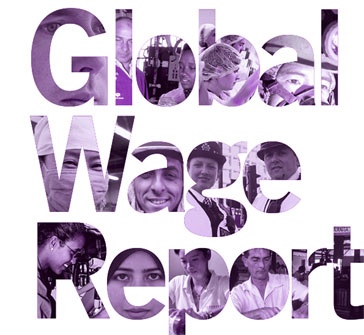11 December, 2014A new report from the International Labour Organization (ILO) advocates minimum wage policies and collective bargaining to combat wage inequality.
Introducing ILO’s Global Wage Report for 2014/15, the organization’s director general, Guy Ryder, says:
“In many countries, the distribution of wages and paid employment has been a key factor in recent inequality trends. This highlights the importance of labour market institutions and policies – including minimum wages and collective bargaining – that have an effect on income distribution.”
Wage growth in developed economies has slowed to almost zero, with actual declines in some countries. According to the report, average wage growth in developed economies fluctuated around 1 per cent per year since 2006 and then slowed further in 2012 and 2013 to only 0.1 and 0.2 per cent respectively.
“Wage stagnation must be addressed as a matter of fairness and of economic growth,” said Sandra Polaski, the ILO’s Deputy Director-General for Policy. “And because overall inequality is driven significantly by wage inequality, labour market policies are needed to address it.”
However, wages in developed economies remain on average about three times higher than in the group of emerging and developing economies.
In developing economies, the report reveals vast differences in regions.
In 2013, wages grew by 6.0 per cent in Asia and 5.8 per cent in Eastern Europe and Central Asia but only 0.8 per cent in Latin America and the Caribbean.
In the Middle East, wages appear to have advanced by 3.9 per cent, but only by 0.9 per cent in Africa, however the data for these regions is still incomplete.
The report also says that in a majority of countries where inequality has increased, such as in the United States or in Spain, changes in wages and employment have been the dominant force.
The wage gaps between different groups of workers such as women, migrants and workers in the informal economy also contribute to the overall inequality.
The gap between wages and productivity has also widened, especially in developed economies, meaning that although the value of goods has increased, it is not matched by higher wages.
“This trend means that workers and their households are getting a smaller share of economic growth while the owners of capital are benefitting more,” says the ILO.
“While fiscal redistribution mechanisms, including taxes and social protection policies are also part of the solution, they cannot bear the full burden of addressing inequality. A comprehensive strategy will include minimum wage policies, strengthened collective bargaining, elimination of discrimination against vulnerable groups, as well as progressive taxation polices and adequate social protection systems,” said Polaski.
Jyrki Raina, general secretary of IndustriALL Global Union, said:
“We welcome the conclusions of the report, which endorse our actions to achieve a living wage through both comprehensive national minimum wage campaigns and robust collective bargaining at industry level."
